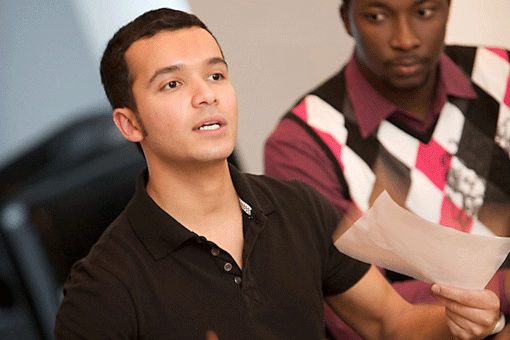Educating teenagers often means keeping them motivated to make it to graduation. With today’s bleak job market and wide wage differentials between the skilled and unskilled, the draw toward crime, violence and drug abuse is particularly strong for those who don’t complete their education. But getting at-risk students to the cap-and-gown ceremony isn’t easy.
As the founder and executive director of Fusion Jeunesse (Youth Fusion), a program that targets at-risk immigrant youth between the ages of 12 and 17, Gabriel Bran Lopez is doing his part to keep kids in school in the Canadian province of Québec.
Lopez, a 26-year-old native of Guatemala, emigrated to Canada with his family in 1986. Growing up in Hochelaga-Maisonneuve and Saint-Michel, two of the “rougher” neighborhoods of Montréal, Gabriel found it difficult to focus on his studies. Fortunately, theater and acting kept him engaged in school, leading him ultimately to graduate from Montréal’s Concordia University with a degree in communications studies. Unfortunately, for many Montréal youth, finding a “hook” to keep them interested is hard: nearly one-third of students enrolled in high school drop out or don’t graduate by the age of 20.
The reality in these neighborhoods inspired Lopez to reach out to students directly. In 2006, he began speaking at secondary schools around Montréal about his own experiences. “I would tell kids about the theater programs I was a part of, the radio shows I hosted,” he recalls. “Students would line up and say, ‘it would be great to have these in our school, but we don’t have the people to lead us in starting them. If I call you tomorrow, if a hundred of us call you tomorrow, can you tell us how?’”
And so the idea for Youth Fusion was born. In 2008, with funding from Concordia, Lopez launched a pilot program in two Montréal high schools. By year’s end, absenteeism had fallen and student participation had increased. Gabriel then approached other universities such as McGill, the University of Montréal and Polytechnique Montréal to hire students to work in high schools targeted by the Ministry of Education, Leisure and Sport in Québec. Today, Youth Fusion operates in 20 high schools across the province.
Seeking to increase student enthusiasm, Youth Fusion enlists university students and recent graduates to implement and manage special programs. Among the programs it offers is help in starting a small business, arts and community service projects, and even sports clubs like rock climbing, skateboarding and boxing.
The one thing all the activities have in common is that they are student-led, which Lopez considers key. “Giving kids a chance to really experience something concrete, that is engaging, and that mobilizes many people in their communities is the idea behind Youth Fusion,” he says. “Sometimes school may seem irrelevant until a trigger makes it look relevant.” Lopez, it seems, has found a way to supply students with that trigger. In fact, school administrators at James Lyng and Pierre-Dupuy high schools, the first two schools in which the program was launched, have shown a 40 percent decrease in absenteeism while also recording an increase of 12.6 percent in graduation rates.






